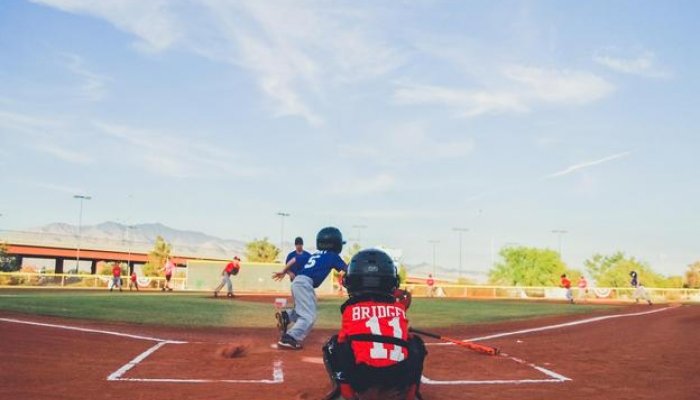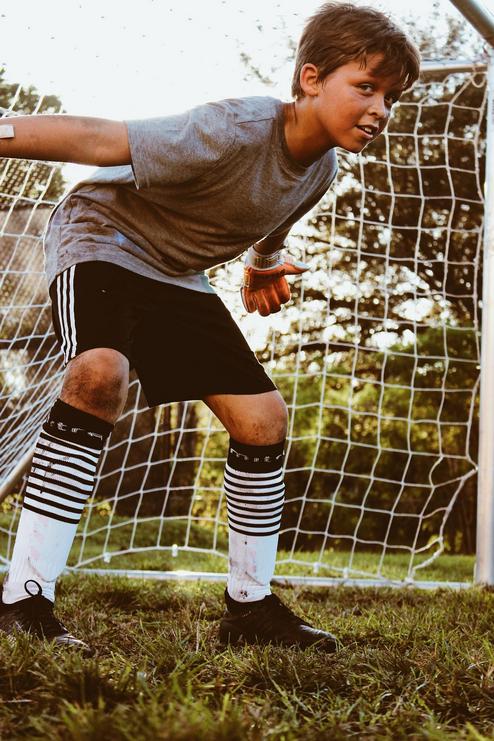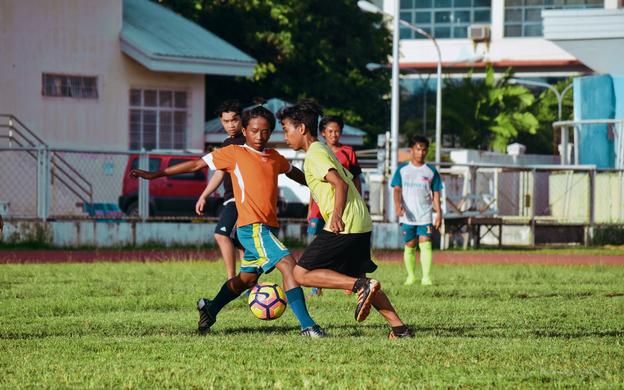Should Your Child Focus on One Sport Only?

When your kid gets involved in organized sports - whether it’s at 4 years old on those tiny soccer fields or 5 years old at T-ball - your parent-heart delights.
At Daniels Chiropractic in Racine, Caledonia, and Mt Pleasant we are great fans of involving healthy youth in organized sports. But we want it to happen safely.
What looks like only slightly organized chaos when very young athletes begin a sport, in time coalesces into new skills, a growing coordination, and actual teamwork. Soon you are watching your child work with other kids, listen to their coach, grow in confidence, and relish a well-earned win. What’s not to love?
Learning to collaborate with others on a team is not the only plus of organized sports, of course. They are also an excellent avenue to develop grit, perseverance, and, in time, proven character.
And naturally, being involved in some kind of healthy physical exercise, such as organized sports, is really important for children’s health. Sports are an excellent vehicle to accomplish so much in a growing youth’s life.
Sadly, there’s been a decline in youth involvement in sports, particularly in high school aged students. Some of this is likely due to increased participation in e-sports (computer games). Meanwhile, childhood obesity rates continue to rise. Many parents feel that tension and know the value of sports to help your child burn off energy or, if needed, to get and stay fit.
So, when a young athlete shows particular talent and dedication in a particular sport, parents and coaches eagerly encourage what they are seeing. That’s a natural response and not necessarily a bad thing.
When Is It Too Much?
But, can this focus and dedication be steered too narrowly to the detriment of the child?
The question of sports specialization is a difficult one:
Should a young athlete (under the age of 12) engage in a single sport for years at a time (at least 3 years) at the exclusion of other sports?
This isn’t an easy question to answer for several reasons.
Sticking at a sport develops the perseverance we want to see in our children. This dedication can lead to healthy time management at home, at school, and on the “field”. It can also lead to excellence in skills and performance - and we love to watch our kids excel at school or in sports! They are learning skills that will also help them do well in life.
If your child is really gifted, she or he can set themselves up for the opportunity to attend well-known training academies and for recognition from college and professional coaches. There’s a lot here to be tempted by.

However, specializing in a sport too early and too much can have detrimental effects on the long game. When a young athlete focuses intensely on a single sport, they are far more likely to experience greater injury and even burnout. Intense, repetitive athletic activity is a big risk factor for injury for all athletes, young and old, and especially for female athletes. They are more physically impacted by the long hours devoted in sports specialization than males.
At young ages, athletes are still learning technique and when and how to condition. But poor technique, substandard equipment, improper training methods, and poor conditioning can set your child up for overuse injuries before you realize what has happened.
Every sports activity invites a chance of injury. But, as the intensity level and training volume increases, as is done in sports specialization, the chance of injury dramatically increases.
A series of studies in the Journal of Athletic Training were performed to evaluate the effects of being a specialized athlete at a young age. They found that focusing on one sport, too early and too intensely, increases the risk of major, career-threatening injury later in life.
Of course, they also found that the kind of injury correlates to the sport:
- In girls' basketball, soccer, and volleyball, specialization increased the risk of knee joint and hip injuries.
- In baseball, especially Little League, pitchers who specialized had a higher risk of elbow and shoulder injuries.
Repetition Is Not Good For Rapid Growth
To get really good at an athletic skill requires repetition. But young athletes are growing at a rapid rate because of puberty and adolescence, and the combination can be dangerous.
All of that repetition creates microtraumas in the athlete’s muscles - which is fine, even helpful, for mature bodies. As the young body grows, the change in body weight, height, and muscle mass already stress joints and connective tissues.
If the microtrauma of repetitive training happens in areas that are still growing, the growth cartilage in the affected areas are vulnerable to stress. If muscle develops from repetition faster than bone, areas of musculotendinous attachment can be more susceptible to injury. Such examples include Sever’s disease and Osgood-Schlatter disease, which are rarely found in adults.
What’s the Best Approach?
Building overall athleticism before honing laser-sharp athletic focus is the best way forward for young athletes. Youth need to move well foundationally before they move more and at higher intensities.
The best approach is to encourage overall movement until the young athlete is developmentally ready to learn high-level, sport-specific skills. Waiting for physical maturation will give them the strength required and speed needed to succeed at a specific sport.
The problem is that early sports specialization creates a lack of cross-trained foundation. The whole body needs development when you are growing up, not just a certain set of muscles or abilities. Specialization inhibits the body’s natural capacity for adaptation and leaves young, aspiring athletes more prone to injury.
In contrast, involvement in multiple sports during the early years builds fundamental motor skill development. This basic level of motor skill development will provide the necessary foundation for success in all kinds of skills such as running, jumping, kicking, and throwing.

The Best Athletes Know Better
At a sports panel with the Junior NBA and the Positive Coaching Alliance, two-time NBA MVP Stephen Curry spoke on the topic of playing multiple sports. He thinks that children and adolescents should not specialize in a single sport too soon.
Because […] you might be better (than your peers) at any certain sport, you might feel comfortable in that space, and that zone. But you don’t really get to push yourself. You don’t really get to test yourself and how you deal with failure and success.
Diversify For Their Health
Alternating sports can help your young athlete vary the kinds of training they do. This means they can avoid repetitive activities that place too much physical stress on a young athlete’s body.
If your child just prefers one sport, during the offseason be sure he or she is doing overall strength training and conditioning. Establishing strength in the lesser used muscles and joints will help prevent injury and allow the body to rehabilitate and rest during the offseason. This also gives the body a chance to develop balance and increase bone health.
When athletes are more balanced it leads to better outcomes in performance. They are fresh when the new season comes around.
Their body is refreshed and their outlook can be refreshed. Statistics show that almost 55% of parents encourage their children to specialize in a single sport. Is it possible that you are wanting specialization in a sport even more than your child? It’s something to consider.
Sports are an opportunity to push through hard things and learn to persevere in difficulty, for sure. But they should also be fun overall for young athletes. Diversifying your child’s sports involvement can really help their emotional and mental well-being long-term. When kids specialize too early there is a high chance of burnout.
Burnout in youth sports is physical and emotional exhaustion from the demands of excellence at a single sport.
Add in the possibility of injury from overtraining and burnout can lead a young, promising athlete to withdraw or drop out entirely. In the end this defeats the whole purpose of youth sports.
Mixing up your child’s sports involvement will help prevent injuries. And playing a variety of sports can create an environment that is both physically and emotionally nurturing and productive. Once the foundations of proper movement have been developed in your child, then moving on to sports specialization may be appropriate. Talking with your pediatrician can help you decide when a focus on one sport is healthy.
At Daniels Chiropractic we encourage youth to engage in sports! It’s a fantastic way to develop gross motor skills, grow personally, emotionally, socially, and keep fit physically. A positive and healthy young athlete is able to weigh their options to focus and chase after becoming an elite athlete — if he or she desires that.
Come See Us
We see a lot of athletes, young and old, at Daniels Chiropractic. If you are experiencing joint stiffness, discomfort, or pain in your muscles, we can help you on your road to recovery.
At Daniels Chiropractic we can address issues that have developed throughout the body from sports overuse or overtraining. We can help you or your youth with joint and muscle mobility and flexibility. If needed, we will work with your primary doctor or a specialist to set up a full treatment plan.mWe are committed to helping you feel, move, and live better. Give us a call at 262.638.9999 to make an appointment.
Daniels Chiropractic Office
2609 Rapids Drive
Racine, WI 53404
Phone: 262.638.9999
Fax: 262.638.0742
Sources:
- Hainline, B. (2019) Early Sport Specialization: Shifting Societal Norms. Journal of Athletic Training: October, Vol. 54, No. 10, pp. 1011-1012.
- “The growing trend of youth sports specialization.” Posted Mar 6, 2018. PR Newswire for the American Academy of Orthopedic Surgeons. Retrieved Feb 2020 from: https://www.prnewswire.com/news-releases/the-growing-trend-of-youth-sports-specialization-300608434.html
- Newman, L. “Studies: Sports specialization at young age increases risk of career-threatening injury.” Posted Oct 22, 2019. USA Today High School Sports. Retrieved February 2020 from: https://usatodayhss.com/2019/jat-nata-sports-specialization-young-age-can-be-harmful
- Caruso, T.H. (2013) Early sport specialization versus diversification in youth athletes. National Strength and Conditioning Association. December, Vol. 2, Issue 4. n.p.
- Kutz, M, and Secrest, M. Contributing factors to overtraining in the adolescent multi-season/sport athlete. Strength and Conditioning Journal 31(3): 37-42, 2009.
- Holt, J.B., et al. (2020) Progressive elbow magnetic resonance imaging abnormalities in Little League players are common: a 3-year longitudinal study. Am J Sports Med. 2020 Feb;48(2):466-472.
- Interview with Stephen Curry with Stack. “Steph Curry says playing multiple sports gave him confidence to be an MVP.” Posted Feb 15, 2018. Retrieved Feb 2020 from: stack.com/a/steph-curry-says-playing-multiple-sports-gave-him-confidence-to-be-an-mvp
